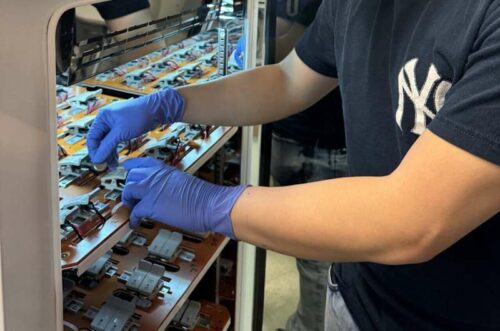Researchers from McGill University have made important progress in creating cheaper and more eco-friendly lithium-ion batteries for electric vehicles.

The global transition to electric vehicles (EVs) is accelerating, but extracting materials for batteries carries a significant environmental footprint and high costs. Research led by McGill University offers promising advancements in developing more affordable and environmentally friendly lithium-ion batteries for EVs. The studies highlight disordered rock-salt-type (DRX) cathode materials, which utilize more sustainable and cost-effective metals.
The first study, spearheaded by Richie Fong, a PhD student in Materials Engineering, focuses on cathodes, the most expensive part of batteries typically made from metals like cobalt and nickel. The researchers explored using iron, a cheaper alternative, which has traditionally been needed to meet the storage capacity needed for long-range EVs.
Published in Advanced Energy Materials, their findings revolutionize this outlook. The team has engineered iron-based DRX cathodes that alter the electron storage process, achieving unprecedented storage capacities for iron-based materials. This breakthrough has the potential to reduce lithium-ion battery costs by 20%.
In a subsequent study highlighted in Energy & Environmental Science, Prof. Jinhyuk Lee, an Assistant Professor in the Department of Mining and Materials Engineering and a William Dawson Scholar, explored another eco-friendly option: manganese-based disordered rock salts (Mn-DRX). While this material boasts high energy content at a low cost, its adoption has been limited due to poor electrical conductivity and structural instability.
Working with colleagues from the Korea Advanced Institute of Science and Technology, Prof. Lee’s team devised an innovative approach. By incorporating multi-walled carbon nanotubes and an adhesive binder as electrode additives, they achieved the highest practical-level energy density recorded for Mn-DRX cathodes.
“Our findings hold immense promise for the future of lithium-ion battery development, offering a pathway towards more affordable and sustainable energy storage solutions,” explains Lee, adding that an industry partner is already working alongside the researchers to bring these innovations to market.
Resources
Richie Fong et al, Redox Engineering of Fe‐Rich Disordered Rock‐Salt Li‐Ion Cathode Materials, Advanced Energy Materials (2024). DOI: 10.1002/aenm.202400402
Eunryeol Lee et al, Nearly all-active-material cathodes free of nickel and cobalt for Li-ion batteries, Energy & Environmental Science (2024). DOI: 10.1039/D4EE00551A






